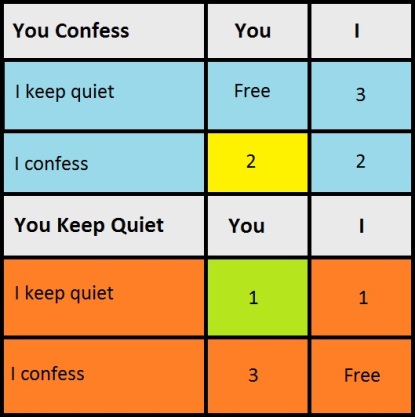THE PRISONER’S DILEMMA
There is a Game Theory concept known as the Prisoners’ Dilemma. This is what it entails: suppose you and I are arrested and placed in separate rooms where we can’t communicate. But, fortunately (?) neither of us can be indicted on the primary charge (say, assault), which carries 3 years in prison. But the cops can put us away for a lesser charge (say, breaking and entering), which carries a 1-year sentence. But they want to strike big. So the good-cop-bad-cop routine starts. They want to turn us against each other. “Testify, and you’ll go free”, they promise.
Now, here’s how your options pan out:
- You can sing (testify against me) and go free
- You can keep quiet (and accept the 1 year in prison)
But since you can’t communicate with me – you don’t know what I’m up to. Surely, the cops have offered me the same deal. The real dilemma is that if we both testify, we both also get 2 years in prison. What do you do?

It seems easy, doesn’t it? Just sell me out and get the hell outta there! But, wait! What if I am doing just the same? If we both sing – both get 2 years remember? That’s worse than the 1 year each if no one talks. So why not just keep quiet? Well …because if you keep mum, I’ll probably sell you out either way, shack up with your wife and you end up with three years.
Its roughly similar to the problem presented to passengers of the two ferries in the Dark Knight. If none detonated the bomb, everyone lived. One could kill the other, while the worst outcome was mutual destruction. And neither knows what the other is thinking. Take a look at the scenarios and their corresponding prison sentences below:

THE RATIONAL CHOICE
I’d appreciate it if you didn’t rat me out. Because I’d do that for you. But emotions / sentiments seldom play a part in rational decisions. In Game Theory, the dominant choice is to betray. Think about it, if you betray me, this is what happens. if I stay silent, you go free. If I talk, you get 2 years instead of three. The underlying assumption is that I, too, will fess up. This is what the purely rational being would do.
THE EXPERIMENT
Two researchers Menusch Khadjavi and Andreas Lange, of the University of Hamburg, put the theory up for test. They employed female inmates from a Saxony Prison and students. Instead of sentences, they used Euros (for students) and coffee / cigarettes (for prisoners). They conducted both simultaneous and sequential (i.e. one deciding before the other, then the other decides, then first decides again and so on) versions of the experiment.
In the simultaneous (i.e. real time) version, 37% of students cooperated between themselves (Game Theory says 100% would act selfishly and never cooperate). Inmates cooperated a staggering 56% of the time. 13% got mutual cooperation – the best possible combination of outcomes.
In the sequential game, one prisoner had to act first – based on either pure-rationality or blind trust / good faith. The other could then decide to act rationally, return the favor or show goodness of heart. A whopping 63% students cooperated, so the mutual cooperation rate skyrockets to 39%. Inmates cooperated about 50%+ times.
WHAT DOES IT ALL MEAN?
What the experiment – like the ferry-bomb outcome in the Dark Knight – suggests, is that human beings are not purely rational creatures. They don’t always act to promote self interest as suggested by the profit-maximizing maxims of our times. Instead, we make complex decisions that are fueled by kindness, consideration, social-consciousness and vengeance. To me, that represents a better understanding of our world than the one where my friends always sell me out.
This was such a great post! It took me some time to understand the charts, but I loved the way you chose to share this information. It would be a tough situation to be in, this Game Theory.
Hehe – yeah, I wouldn’t want to be in the prisoners’ shoes either. Lest someone should ‘bust a cap’ in me once I got out 😀 But what about the experiment? How cool was that? Thanks for reading.
Awesome post 🙂 you took a right real world scenario to express your thought!
Thanks Chethan. Indeed it was the Hamburg experiment that allowed me to expound my idea into a real-world scenario. Thanks for reading and commenting. Much appreciated.
Very Good Write up ! At first on seeing the picture I thought it would sound something like “How to avoid boys” Or stuff lol But You have explained the theory so well and in an interesting way ! Love the chart illustration 😉
Hahaha …’how to avoid boys!’ – like anyone in the world would read that! But yeah, weird choice of pics – but once you read the post, doesn’t it start to make sense? Thanks for reading and liking my chart. I,too, am very proud of it 🙂
Lol Then what do you think why I started reading it 😉 😛 Lol
Yes It was really great ! Loved it 🙂
Hahaha – you have the enviable virtue of being able to take yourself (and others) lightly. I’ll most definitely write something about ‘how to avoid boys’ very soon 😀 – with the same picture too! How’s that?
A fascinating post though you only really refer to Game Theory as your main protagonist. I think when you apply Social psychology and maybe even a little bit of evolutionary theory you start to make sense of the actual findings you quote. Psychologists have wondered for years over apparent altruistic behaviour found, not just in humans, but in most species of animal, Applying logic (which Game Theory is) says this shouldn’t happen. But when we appreciate that most species evolved to live in communities and protecting genetic seed of the community is as important as protecting our own, then everything here falls into place.
The reason for the dilemma at all, of course, is that this situation pits our personal ‘seed’ against the ‘communal seed’. The latter will result in the greatest success for the whole group (in this case just two but the primal urge is there for protecting entire clans) as long as everyone plays ball. The reason not everyone does play ball is that humans are not actually logical rational thinkers. Few if any of us in this situation would work out charts as you give, metaphorically or otherwise, but would tend to go for ‘gut instinct’. In common parlance under ordinary circumstances we call this thinking ‘out of the box’ and encourage it as it leads to unexpected and often productive results. In the prison situation, however, it can result in the altruistic member of the pair coming off worse.
I really enjoyed this early morning thinking exercise so thank you for the piece. 🙂
Hey Ken, love how you boiled it down to pitting the self against the community. Hadn’t thought of it in those terms. I don’t see Game Theory as the main protagonist here – but as a mathematical modeling for predicting purely rational behavior. Protagonist implies a moral choice – which has been deliberately cleaved out from the scenario. I guess its greatest value is in its simplicity – which, axiomatically, compromises its approximation of reality.
The basic idea behind the Prisoners’ Dilemma is to derive an exclusively logical-rational response to a hypothetical situation. Hence, by definition, social psychology and the like are left out from the scenario. I guess it’s valuable as a frame of reference – to compare our gut-feel responses against. And what I really love is that it succeeds in building-in the fact that altruism may cost you – which is a great approximation of reality in such a simplistic model.
Really glad you enjoyed reading.
I’d be interested to see how this played out with corporate executives and politicians, the two most self-serving groups of people on the planet.
Haha …great idea, Daniela. And also Tony Stark (Ironman), I say 😀 Thanks for reading, hope you swing by sometimes.